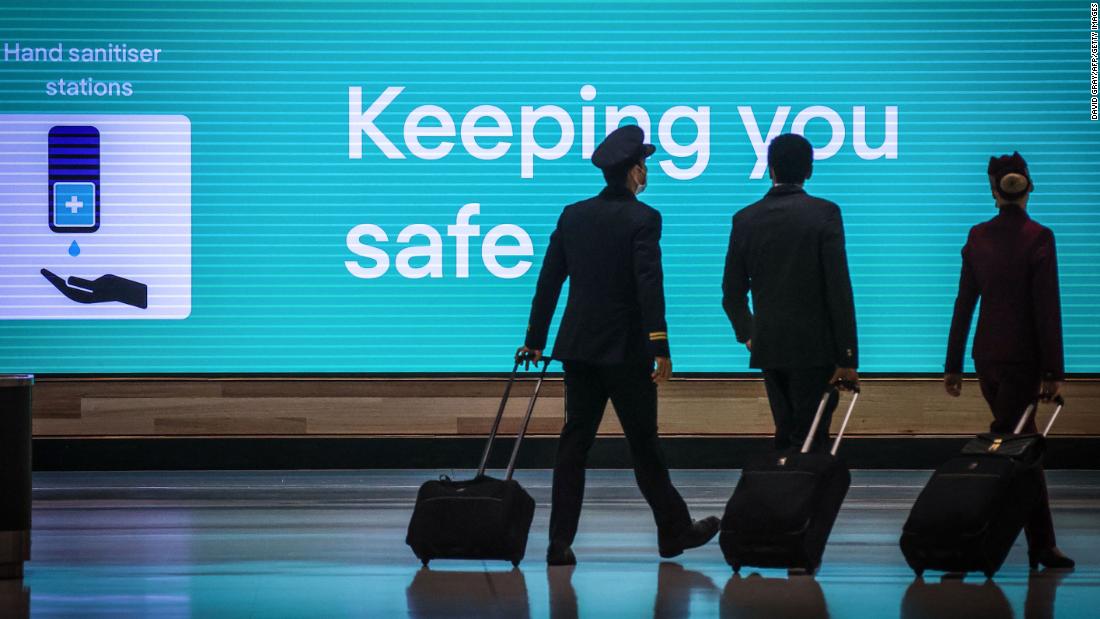
In Australia and Taiwan’s fight against COVID, flight crews have proven their Achilles heel
(CNN) – Countries across the Asia-Pacific region have closed borders and imposed strict quarantine requirements, isolating themselves from the world.
But in many jurisdictions, there is a major exception to these rules: flight crews.
For months, flight crews in a number of places – including Taiwan and Australia – have avoided the strict quarantine rules imposed on other international travelers. But violations of the rules by airline employees at both places in December raised questions about whether the airline workers’ exceptions pose an unnecessary risk to the public.
But it is a difficult dilemma. While health experts say treating flight crews differently is a loophole in an otherwise difficult border approach, aviation industry officials say exemptions are needed to keep the industry running – and to avoid endangering the mental health of flight crews.
What happened in Australia and Taiwan?
When Taiwan reported its first locally transmitted case in more than 250 days on December 22, authorities quickly pointed to a foreign pilot as the source of infection.
Other places – including Hong Kong, New Zealand and Australia – have also given airline crews an exemption from their strict border policies.
Australian rules differed from state to state, but previously, Australian-based flight crews traveling to New South Wales were allowed to quarantine at home in place of quarantine facilities at state-run hotels, while international crews were required to quarantine in One of around 25 hotels until their next flight, although they were not as monitored by authorities as other international travelers.
It was strict by international standards, but still more relaxed than other incoming travelers had faced – two weeks in quarantine at a state-run hotel at their own expense.
Why are flight crews treated differently
Even with severe restrictions in Australia and Taiwan, flight crews are still treated differently from other travelers. And in a number of jurisdictions, many crew members still do not have to quarantine at all.
Albert Tjweng, a spokesman for the International Air Transport Association (IATA), which represents 290 airlines, said the crew was different from regular travelers – they make frequent flights, and they don’t wait to get out of quarantine to achieve their goal. Their journey, and they are well aware of the risks and requirements. “(The cabin crew) are fully aware of their livelihood vulnerabilities to any gaps in infection control,” said Tigwing.
The exceptions were also out of concern for the mental health of the crews. Unlike regular travelers who may only take one trip home this year to see their family, flight crews often do international flights. This means that they may spend entire weeks or months in quarantine effectively.
This was the case for a Taiwan-based China Airlines captain who is estimated to have spent around 50 days in quarantine this year. He flies between Taipei and Sydney roughly once a month, and each time he’s required to quarantine for three days at each end.
The captain, who requested anonymity because he is not allowed to speak to the media, said he has dealt with quarantine, but this is a concern for both mental health, and enabling people to stay with and care for their families. Children. Days spent in quarantine are unpaid.
“I don’t think the entire community, or the company, or even the (Taiwanese) CDC really cares about our mental health, they just care about public health, and they don’t really care about that part of us,” he said.
Should quarantine rules be tightened?
Health experts argue that the exemptions create a potential loophole for the Coronavirus to infiltrate places that otherwise successfully kept it away.
Hong Kong, New Zealand, Taiwan and Australia have all been relatively successful otherwise in containing the outbreak, thanks in part to strict border policies.
But the International Air Transport Association has called on governments to grant flight crews that do not interact with the public an exemption from quarantine requirements to ensure the continuation of cargo supply chains. Last March, the association’s general manager and chief executive said that delays in global supply chains “put lives at risk”.
Tigwing of the International Air Transport Association said the stringent requirements “make it difficult for cabin crew who operate in those destinations.”
The International Civil Aviation Organization, a specialized agency of the United Nations, has also called on governments to exclude cargo flight crew members from quarantine.
As for the China Airlines pilot, he understands that Taiwan needs to extend the quarantine to make the public feel comfortable. But he wants the rules to be consistent.
He said: “They do not want us in the public or in the community, and they do not want us to infect others. But it seems that if my colleagues become infected, it is okay.”

“Totale ninja voor sociale media. Introvert. Maker. Tv-fan. Bekroonde ondernemer. Webnerd. Gecertificeerde lezer.”
